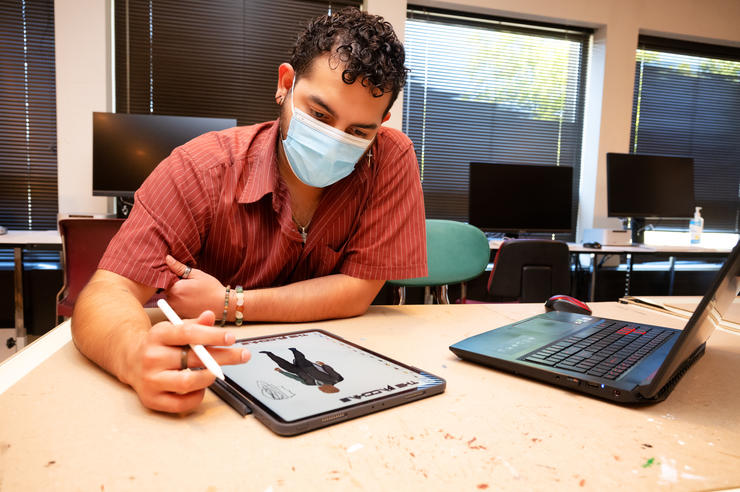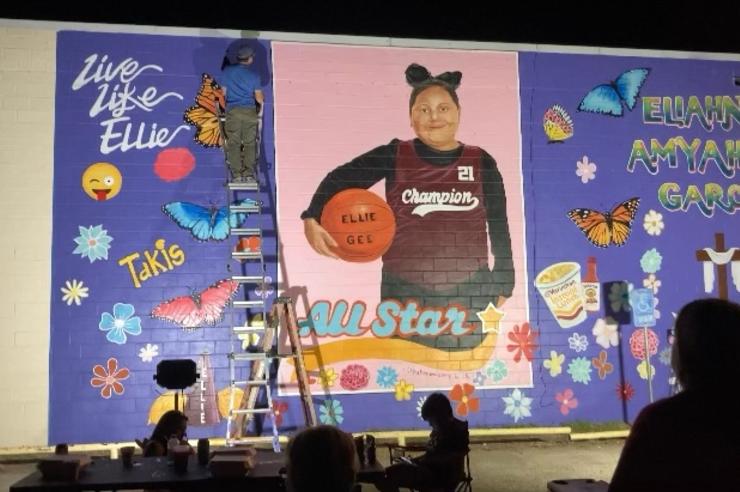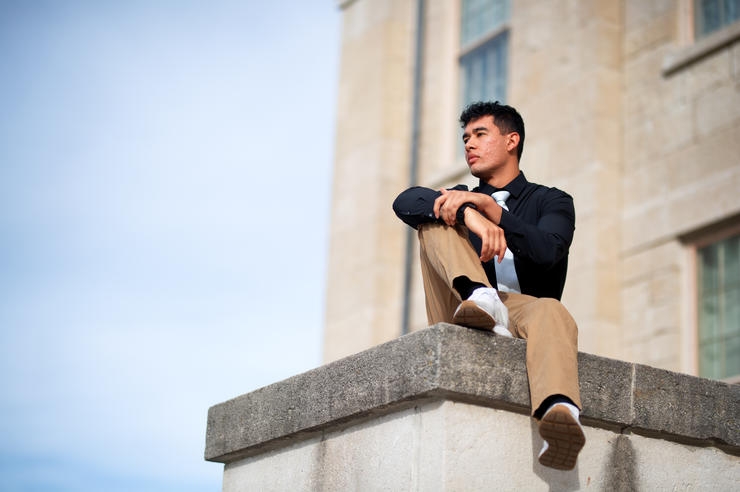Learning to decode the brain
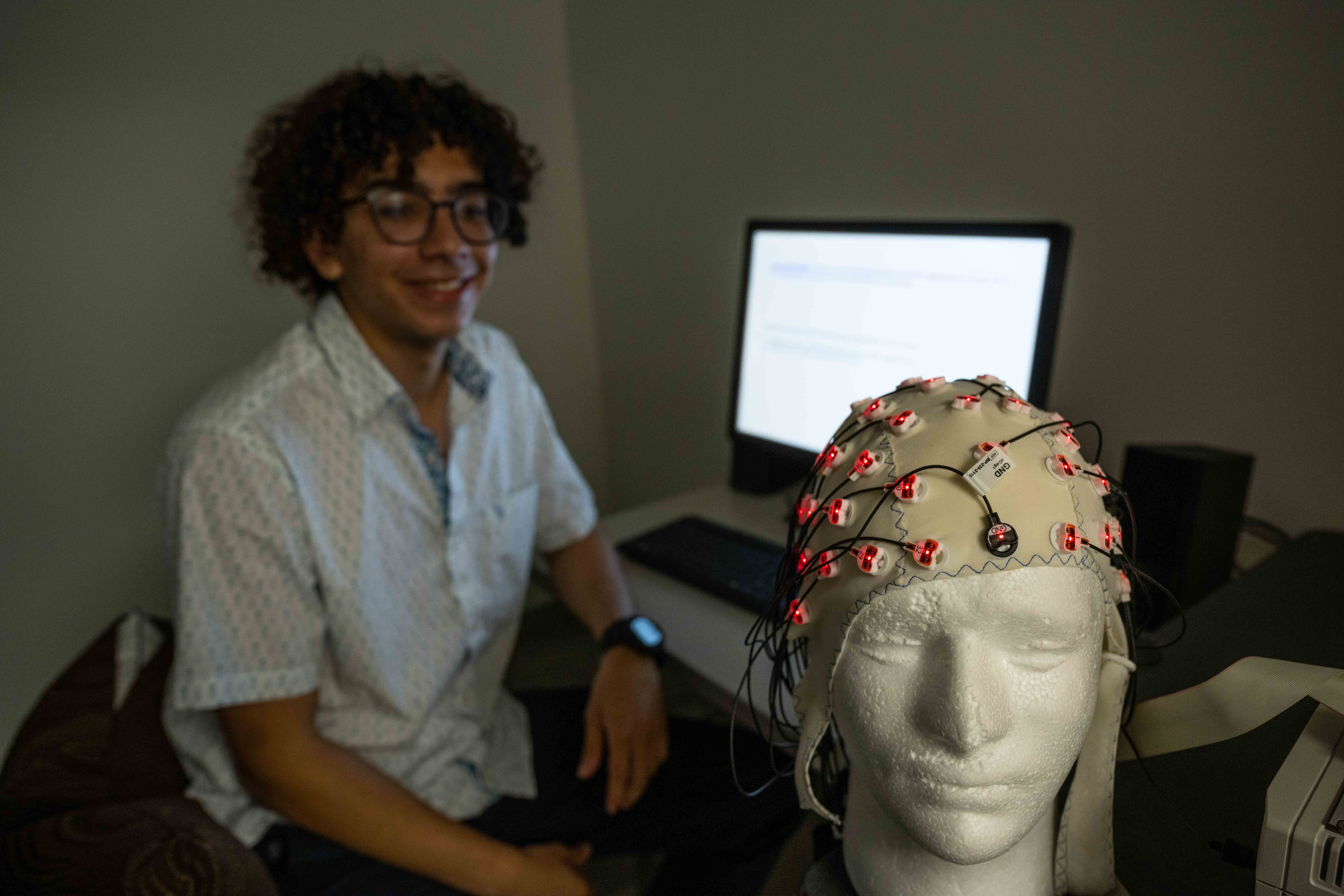
When Héctor Sánchez Meléndez was 7 years old, his parents gave him an interactive book on the human body. He was so fascinated by the section on the brain and nervous system that he decided to become a brain surgeon—a goal that led him to the University of Iowa.
“I thought it was important to be a neuroscience major, and that’s harder to do back home,” says Sánchez Meléndez, who is from Puerto Rico and will earn a BS in neuroscience from Iowa in 2023. “At the University of Puerto Rico, one of the best universities on the island, there is a biology major but not a neuroscience department. I knew there would be better opportunities at a larger university like the University of Iowa, and I think coming here has paid off.”
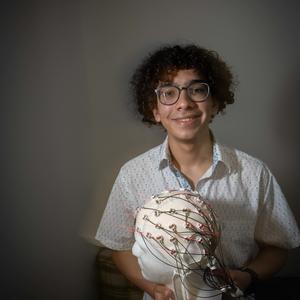
University of Iowa neuroscience major Héctor Sánchez Meléndez came to campus from Puerto Rico, the U.S. territory in the Caribbean where he was born and raised. He hopes to return and start a research lab.
“Like many other Puerto Ricans, I came here to get a better education and find better opportunities. Although many choose to stay because things are tough back home, I plan to go back,” he says. “I miss the sense of community. Puerto Rico is extremely vibrant and welcoming.
“During the island’s toughest times, like post–Hurricane Maria, everyone was there for one another,” says Sánchez Meléndez, whose homeland recently experienced severe damage from Hurricane Fiona. “The food is amazing, the beaches and forest are beautiful, and the people are delightful, so much so that leaving is very difficult. If you ever get a chance to visit the island, I would take it.”
Little did Sánchez Meléndez know that his student experience at Iowa would alter his career trajectory. First, the professor in a pharmacology class he took his sophomore year encouraged him to consider PhD programs. Then, an email from Jan Wessel’s Cognitive Neurology Lab invited him to participate in a weeklong summer workshop on campus for first-generation students interested in human brain research. Not only did Sánchez Meléndez learn to apply the neuroscience techniques he was studying in his classes, he got to know several UI faculty members, including Kristi Hendrickson, the researcher with whom he has been working ever since.
About the same time, the Iowa Sciences Academy shared information with Sánchez Meléndez about how to earn compensation for lab work. Now, he is a trainee with UI-MARC (Maximizing Access to Research Careers), a National Institutes of Health–funded program that aims to prepare a diverse pool of undergraduates for research-focused biomedical careers.
“If you would have told me when I was a senior in high school that in my senior year of college I would get a stipend, health care, and other benefits to work in a lab that I enjoy, I would have said that was too good to be true,” he says. “I didn’t even know that was possible.”
As an undergraduate research assistant in the UI Psycholinguistics Lab, Sánchez Meléndez has contributed to several projects that use cognitive neuroscience techniques to study language and communication. He also was encouraged to create a study of his own.
“In the lab, we work with language in general, trying to understand how different groups of people process words and sentences,” he says. “In one project, we are trying to find out if Spanish–English bilinguals, across their lifespan, activate their first language when they hear a word in their second language—and vice versa. And do they do that in both written and spoken forms? Gaining a better understanding of this will help speech-language pathologists in their clinical work.”
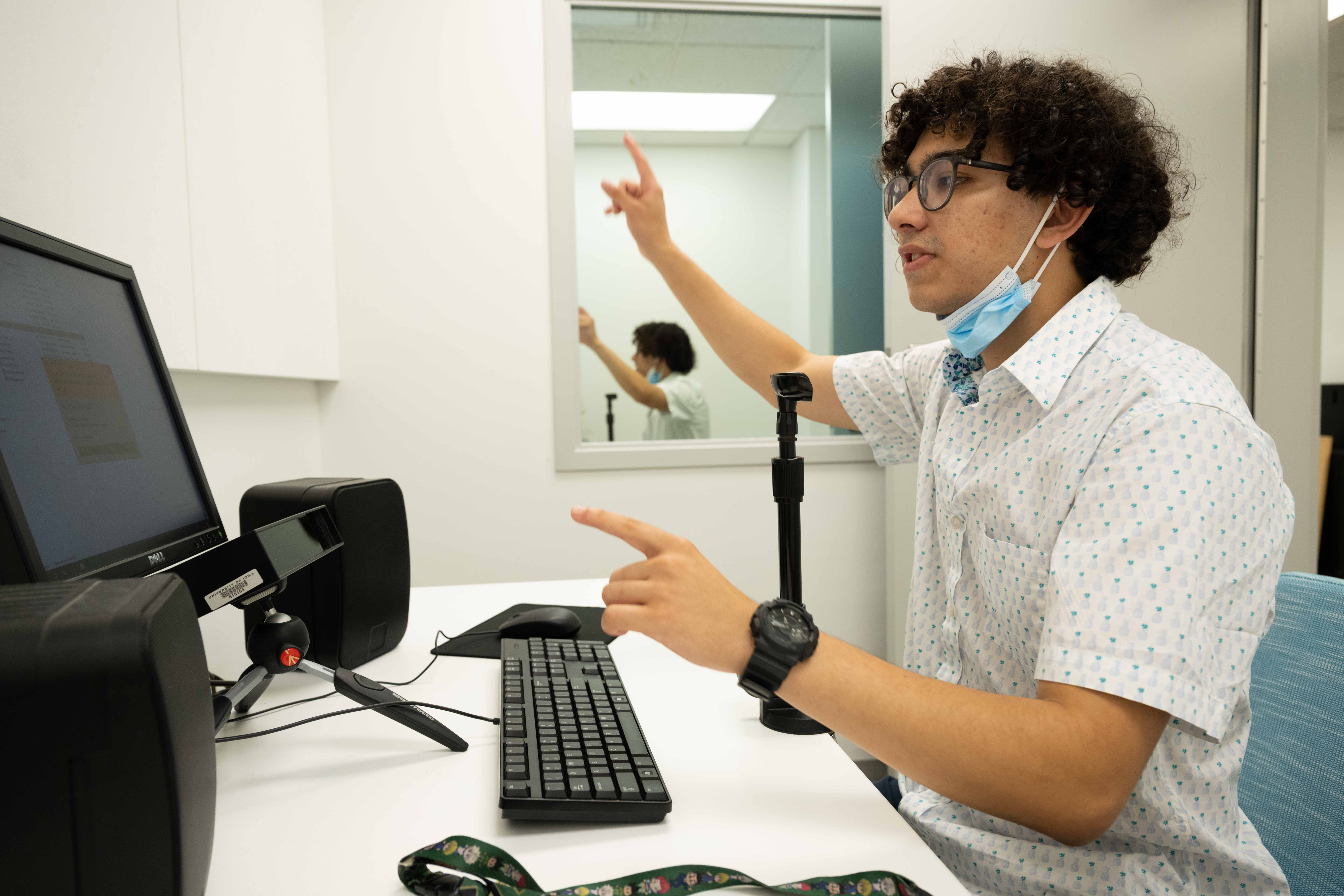
“At the University of Puerto Rico, one of the best universities on the island, there is a biology major but not a neuroscience department. I knew there would be better opportunities at a larger university like the University of Iowa, and I think coming here has paid off.”
When he had an idea about how to establish the role of inhibitory mechanisms in language learning, Sánchez Meléndez approached his faculty mentors, who helped him develop a formal proposal.
“Not only did my mentors give me credit for that project, they’ve given me very important responsibilities in their own individual projects,” he says. “And, if we ever write and publish a paper about the inhibition study, I will be a first author. That’s crazy. I haven’t even graduated.”
The University of Iowa’s BS program in neuroscience is an interdisciplinary major administered by the Department of Biology and the Department of Psychological and Brain Sciences, in cooperation with the Iowa Neuroscience Institute. Students get broad exposure to the study of neuroscience, from molecules and cells to behavior and cognition. Not only are they rigorously prepared for advanced studies, they have the opportunity to work in the labs of top neuroscientists across campus.
In addition to gaining invaluable work experience while also earning compensation, being a student researcher has paid other dividends, says Sánchez Meléndez.
“I’ve improved my writing and reading skills—specifically, reading scientific papers to understand topics that I’m not familiar with and then taking what’s important from each one,” he says. “I’ve also learned how to discuss my research with both professionals and nonprofessionals. For example, sometimes I work with kids and need to be able to talk to their parents about what we’re going to do. Those are skills you don’t really pick up in a classroom setting or through a textbook. Plus, I know more about Institutional Review Boards—you can’t conduct research that hasn’t been approved by one, so that’s been huge.”
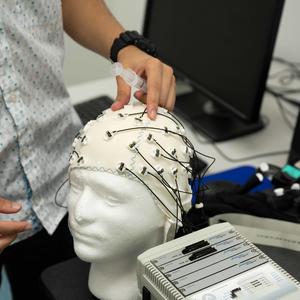
About one in three undergraduate students at Iowa participates in research. A good place to get started is the Iowa Center for Research by Undergraduates, or ICRU. The center works to connect students with faculty and staff from the arts, humanities, natural/physical sciences, social sciences, health and medicine, engineering, and business. Student ambassadors are available to answer questions.
Access to a wide range of professionals at Iowa who are willing to encourage students and collaborate has been surprising to Sánchez Meléndez and convinced him to pursue research as a career. Hendrickson, director of the Psycholinguistics Lab and assistant professor of communication sciences and disorders, says Sánchez Meléndez has been a key contributor on her team.
“Héctor has an unparalleled ability to digest information from scientific articles within the field of neuroscience, synthesize information across articles, and propose novel experiments to examine important questions in the field of neurolinguistics,” she says. “We are lucky to have him, and I have no doubt that he will make an impact on whatever field of neuroscience he chooses to pursue.”
Sánchez Meléndez currently is planning to attend a doctoral program in cognitive neuroscience but says he may first log another year or two working in a lab. Ultimately, he hopes to establish his own lab in Puerto Rico.
“I don’t think that’s going to be easy—although there’s a hospital and medical school at the University of Puerto Rico, the faculties are much smaller, so there are fewer people working in those areas—but it’s something I’m aiming for,” he says. “I’m very prideful about where I come from, and I want to be able to make my homeland better.”
